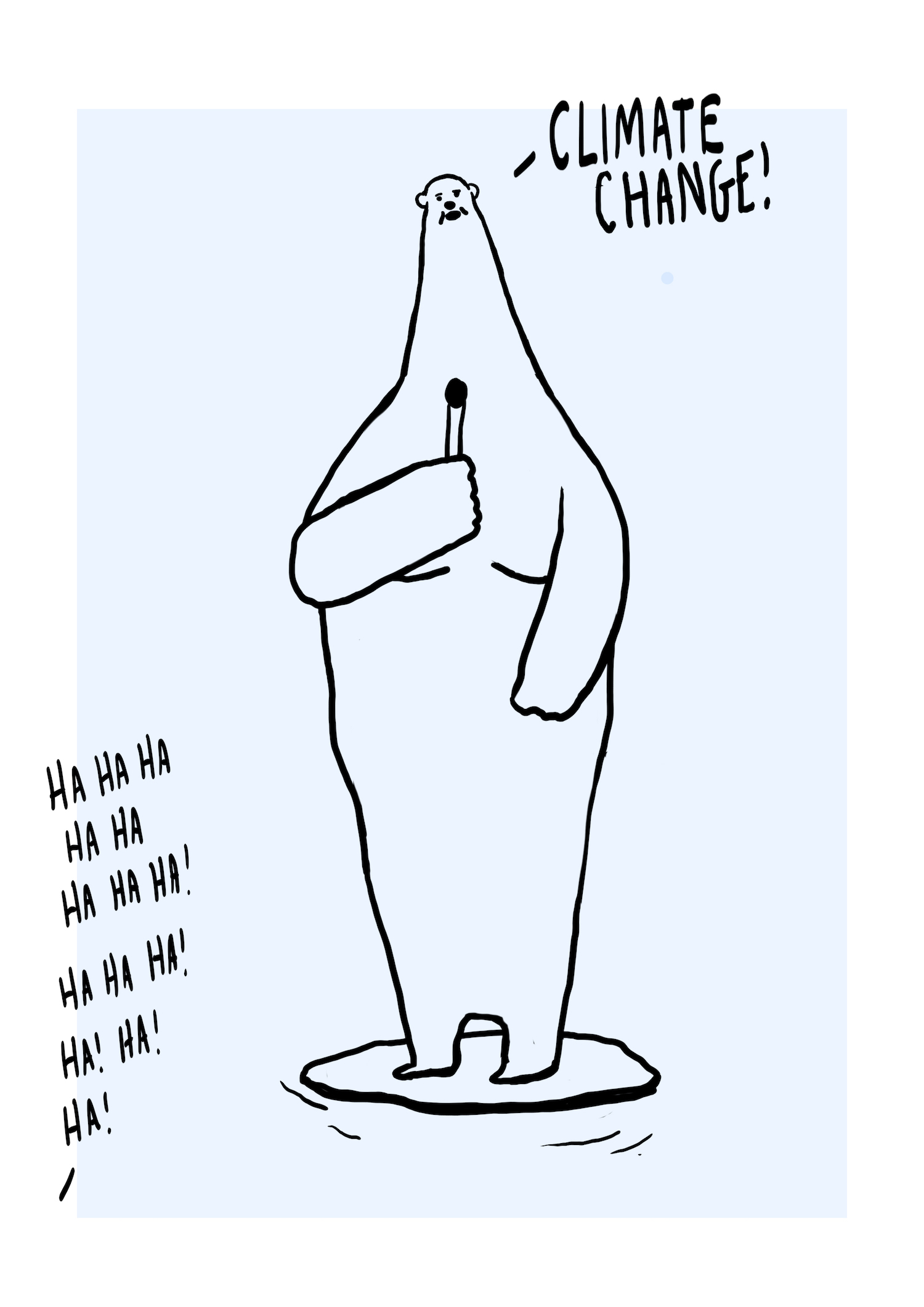Is Climate Change a Laughing Matter?
Illustration by Ben Hammond.
Wrods by Reena Gupta
Illustrations by Ben Hammond
Climate change is no joke. But maybe it should be.
In 2018, a Lowy Institute Poll revealed that Australians are slowly waking up to the baleful influence of climate change. 59 percent of those surveyed agreed that global warming is a “serious and pressing problem”. That’s a five percent hike from the previous year, so things are waking up. But in Australia, where carbon emissions are continuing to rise, when the Great Barrier Reef could be a sliver of a memory in just 30 years—when the stakes are this high, is better good enough?
97 percent of experts agree that human-induced climate change is a genuine threat to the planet. So what’s with the hold-up?
A problem with the way that climate change is traditionally communicated to the public is the belief it merits debate. Dr Martin Rice, acting CEO of Australia’s Climate Council, agrees. “That’s what they traditionally call a false balance debate”, he explains. It’s when news sources frame climate change as subject to a debate between ‘skeptics’ and ‘believers’, partly to meet journalistic notions of what ‘objectivity’ looks like. “That means that if they get one person that agrees with climate change… then they need to get someone that doesn't.” But if the very existence of climate change is up for debate, then talking about solutions falls by the wayside. Dr Rice stresses that there’s really no debate to be had. “There’s been scientific consensus for decades now… what we need to be discussing is the solution”. Sadly, false debates only stoke the fires of doubt and stop the conversation from moving forward.
So, how do we get the conversation moving? Well…have you got any jokes?
Illustration by Ben Hammond.
Giordano Nanni, the creator of the satirical YouTube series Honest Government Ads, says that satirists are uniquely equipped to tell the truth. “People trust satire because it cuts through the bullshit more than any other medium”, he says. Talk show host Stephen Colbert, for example, is known for lampooning US President Donald Trump’s love of false equivalencies. In October 2018, Trump said about climate change: “You have scientists on both sides of the issue”. Colbert didn’t mince words in his response. “That is true, there are scientists on both sides”, he teased on The Late Show. “On one side, all the scientists. On the other, one guy who runs a blog called RealTrueAmericanScienceEagle.jesus.” Free from the conventions of traditional journalism, satirists can cut the crap and move the conversation forward – what good climate change communication should do. As the Climate Council explains, “demonstrating agreement on the problem is important to shifting the conversation to solutions”.
This isn’t just armchair pontificating, either. In 2017, researchers from the University of Delaware plopped viewers in front of Last Week Tonight With John Oliver, yielding some exciting results. Subjects watched a segment that sees a fed-up John Oliver stage a climate change debate that boasts true balance. That is: because 97 percent of experts say that climate change is a problem, Oliver pits 97 climate experts against three deniers. Watching the clip both bolstered viewers’ ‘belief’ in climate change and their awareness of a consensus among the scientific community. And this wasn’t just a case of preaching to the converted – stronger effects were noted among participants who reported a lack of interest in the topic before the experiment. “By reducing things down to their essence, often to the point of the ridiculous, satire can both remind people what we’re dealing with [and] what’s at stake”, Nanni says. “It’s not a substitute for science and research, of course; but it complements these by amplifying the message.”
Piling on the facts isn’t going to be enough.
Illustration by Ben Hammond.
Of course, it would be great if the naysayers could be persuaded by handing over an exhaustive bundle of peer-reviewed research. This is what’s known as the deficit model of science communication, which suggests that the gap between the knowledge of experts and the broader community is down to a lack of public education. But evidence suggests that as humans, we just aren’t wired that way. That is, the way that we come to an issue like climate change isn’t just an artefact of whether or not it’s backed by scientists. A soup of factors guide our understanding of these problems, including ideology, political orientation, and environmental values. Which means that piling on the facts isn’t going to be enough.
The beauty of satire is it allows us to luxuriate in an emotional landscape that scientific research can’t provide. In The Big Shrink, a survey of young Australians carried out by VICE in 2018, researchers found that while Millennials and Generation Z count climate change as a critical problem, they find it too complex and uninteresting to act on – what the report calls the ‘woke paradox’. So could satire help spur our terrified arses into action? Nanni thinks so. “If done well”, he explains, “satire can provide a powerful combination of truth and simplicity which can help us to see through all of the paralysing complexity”. And clarity plus laughs gets results. “When people feel they can understand something… the natural response is to get excited, and even inspired about it. And hopefully, that leads to action and better choices at the next election.”




